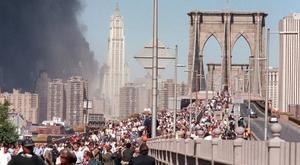Many of us were reminded of this last month, when both a 5.8 magnitude earthquake and Hurricane Irene struck parts of the East Coast. People immediately reached for their phones to call loved ones or 911. Unfortunately, in some cases, loss of power made communication difficult.
The FCC and FEMA are doing everything we can to empower the public to be prepared for all emergencies (you can visit www.Ready.gov or www.Listo.gov to learn more). But one of the lessons learned from that August earthquake was that we can do more to educate the public about the most effective ways to communicate before, during and after a disaster.
Today, we are pleased to release a set of new, easy-to-follow tips to help all Americans prepare their homes and mobile phones for a disaster. These tips are practical things everyone can do to better preserve the ability to communicate effectively during – and immediately after – a disaster.
While we don’t have control over when or where the next disaster will strike, we do have control over what we do to prepare. Check out these tips and please, take one more step and share it with your networks. Use Twitter, Facebook, email or a good old-fashioned phone call to help us spread the word – and help more Americans get ready before the next disaster strikes.
And remember, if you have a question about your particular mobile phone device, contact your wireless provider or equipment manufacturer.
Before a Disaster: How to Prepare Your Home and Mobile Device
- Maintain a list of emergency phone numbers in your cell phone and in or near your home phone.
- Keep charged batteries and car-phone chargers available for back-up power for your cell phone.
- If you have a traditional landline (non-broadband or VOIP) phone, keep at least one non-cordless phone in your home because if it will work even if you lose power.
- Prepare a family contact sheet. This should include at least one out-of-town contact that may be better able to reach family members in an emergency.
- Program “In Case of Emergency” (ICE) contacts into your cell phone so emergency personnel can contact those people for you if you are unable to use your phone. Let your ICE contacts know that they are programmed into your phone and inform them of any medical issues or other special needs you may have.
- If you are evacuated and have call-forwarding on your home phone, forward your home phone number to your cell phone number.
- If you do not have a cell phone, keep a prepaid phone card to use if needed during or after a disaster.
- Have a battery-powered radio or television available (with spare batteries).
- Subscribe to text alert services from local or state governments to receive alerts in the event of a disaster. Parents should sign up for their school district emergency alert system.
During and After a Disaster: How to Reach Friends, Loved Ones & Emergency Services
- If you have a life-threatening emergency, call 9-1-1. Remember that you cannot currently text 9-1-1. If you are not experiencing an emergency, do not call 9-1-1. If your area offers 3-1-1 service or another information system, call that number for non-emergencies.
- For non-emergency communications, use text messaging, e-mail, or social media instead of making voice calls on your cell phone to avoid tying up voice networks. Data-based services like texts and emails are less likely to experience network congestion. You can also use social media to post your status to let family and friends know you are okay. In addition to Facebook and Twitter, you can use resources such as the American Red Cross’s Safe and Well program (www.redcross.org/safeandwell).
- Keep all phone calls brief. If you need to use a phone, try to convey only vital information to emergency personnel and/or family.
- If you are unsuccessful in completing a call using your cell phone, wait ten seconds before redialing to help reduce network congestion.
- Conserve your cell phone battery by reducing the brightness of your screen, placing your phone in airplane mode, and closing apps you are not using that draw power, unless you need to use the phone.
- If you lose power, you can charge your cell phone in your car. Just be sure your car is in a well-ventilated place (remove it from the garage) and do not go to your car until any danger has passed. You can also listen to your car radio for important news alerts.
- Tune into broadcast television and radio for important news alerts. If applicable, be sure that you know how to activate the closed captioning or video description on your television.
- If you do not have a hands-free device in your car, stop driving or pull over to the side of the road before making a call. Do not text on a cell phone, talk, or “tweet” without a hands free device while driving.
- Immediately following a disaster, resist using your mobile device to watch streaming videos, download music or videos, or play video games, all of which can add to network congestion. Limiting use of these services can help potentially life-saving emergency calls get through to 9-1-1.
Check www.Ready.gov regularly to find other helpful tips for preparing for disasters and other emergencies.
Content by: Craig Fugate, Administrator of the Federal Emergency Management Agency and
Julius Genachowski, Chairman of the Federal Communications Commission

